 Technology peripherals
Technology peripherals
 AI
AI
 Plagiarism and cheating, ChatGPT secretly generated 12 signed papers! Marcus blasts Ta for turning into CheatGPT
Plagiarism and cheating, ChatGPT secretly generated 12 signed papers! Marcus blasts Ta for turning into CheatGPT
Plagiarism and cheating, ChatGPT secretly generated 12 signed papers! Marcus blasts Ta for turning into CheatGPT
Marcus is here to challenge ChatGPT again!
Today, Marcus wrote on his personal blog: Things are getting more and more outrageous.

Check the answer before blowing it
The cause of the matter originated from a line by Fred Ehrsam tweets.
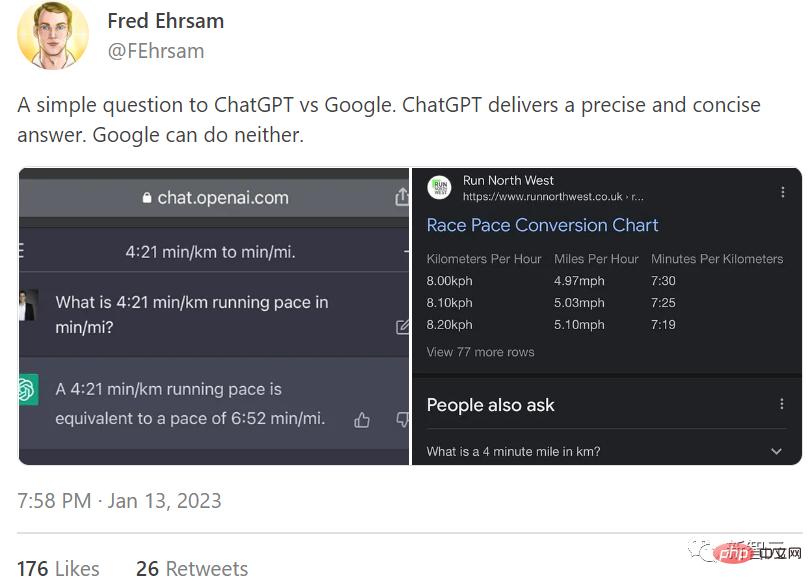
Ehrsam asked both ChatGPT and Google, "How long does 4 minutes and 21 minutes for 1 kilometer equal to 1 mile?" He said that ChatGPT gave to get precise and concise answers, while Google can’t even do it.
In response to this post, Marcus said: "It is arrogant and arrogant, as if it is a symbol of the future world. But by the way, its answer is wrong. "
ChatGPT does not convert the units correctly. The author just wishes that the answer given by this great new tool must be accurate (even accurate to the second!). He did not do it at all. examine.
This is where the problem lies. Statistical word prediction is no substitute for real mathematics, but many people think otherwise. (The speed of 4 minutes and 21 seconds per kilometer is the speed of 7 minutes per mile. If you ask the question well, it will give you the correct answer.)
ChatGPT This "Right , not quite right." The worst part of the answer is not that it's wrong, but that it seems so confident. It was so convincing that Twitter users didn't even think to doubt it.
This is the current situation: ChatGPT is abused, people trust it, and even brag about it, even if it is contrary to the correct answer.
Want to know what’s worse than hype? People began to view ChatGPT as a reliable and well-qualified scientific collaborator.
Help, don’t write ChatGPT as a co-author
Marcus said that regarding ChatGPT, yesterday’s headlines were hyping its tyranny against Google. ability. Today, public opinion is discussing ChatGPT becoming a co-author of the paper.
In a preprint paper published in December last year, ChatGPT suddenly appeared in the author column!
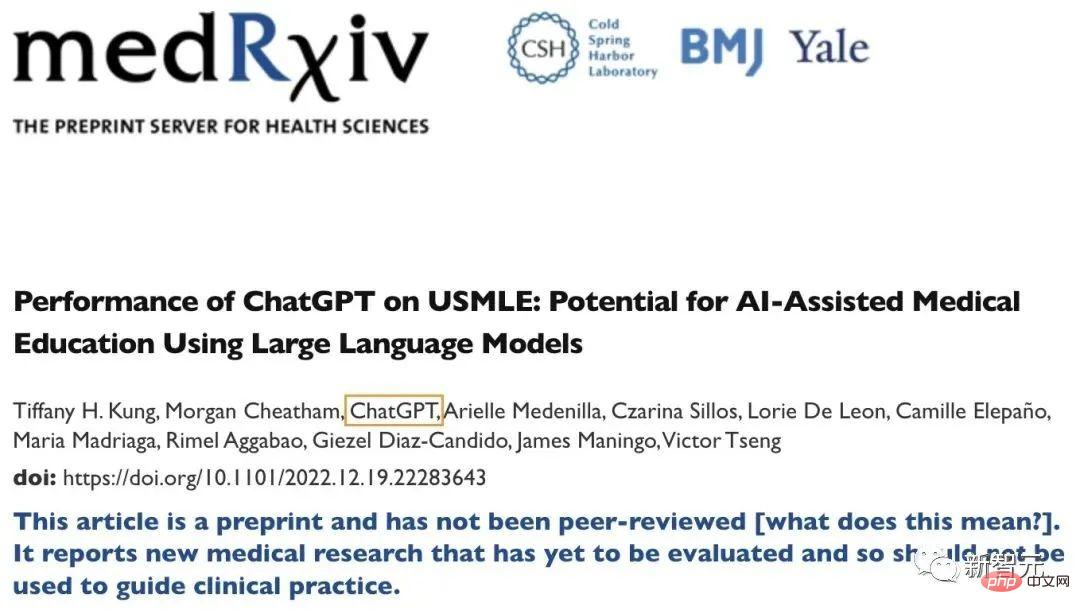
Coincidentally, the name of ChatGPT has appeared frequently in some peer-reviewed papers in the medical field since December last year:
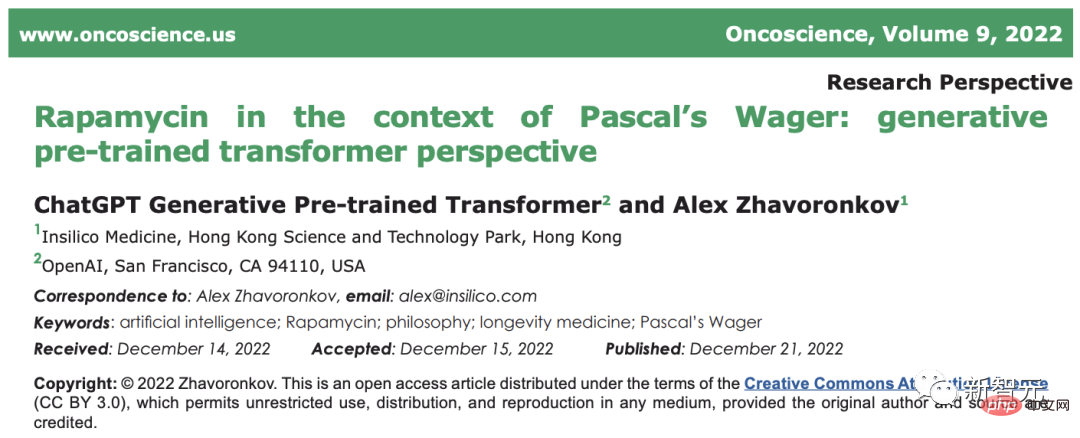
Paper address: https://www.oncoscience.us/article/571/text/
According to Semantic Scholar, the 6-week-old ChatGPT already has two publications, 12 co-authorships, and one citation.
I sincerely hope this trend doesn't continue.
Marcus gave five reasons:
- ChatGPT is just a tool, not a human being. To say that it is a scientist, it is better to say that it is more like a spell checker, a grammar checker, or a statistics package at best.
It cannot provide real ideas, design carefully controlled experiments, or draw inspiration from existing literature. You don't make a spell checker or a spreadsheet a co-author.
For example, you would cite resources in your references such as software packages for brain analysis like SPM. No one would list SPM as a co-author even though it was important to the research effort.
- Co-authorship is defined differently in different fields, but generally, co-authorship is required to make substantial scientific contributions.
ChatGPT simply cannot reason well enough to do this; given ChatGPT’s current level of scientific understanding, giving it authorship is a disservice to the scientific process The disrespect itself.
Marcus wrote in a previous article that ChatGPT has no understanding of physics, biology, psychology, medicine and other subjects, and explained to everyone that "smart and stupid" is What does it look like.
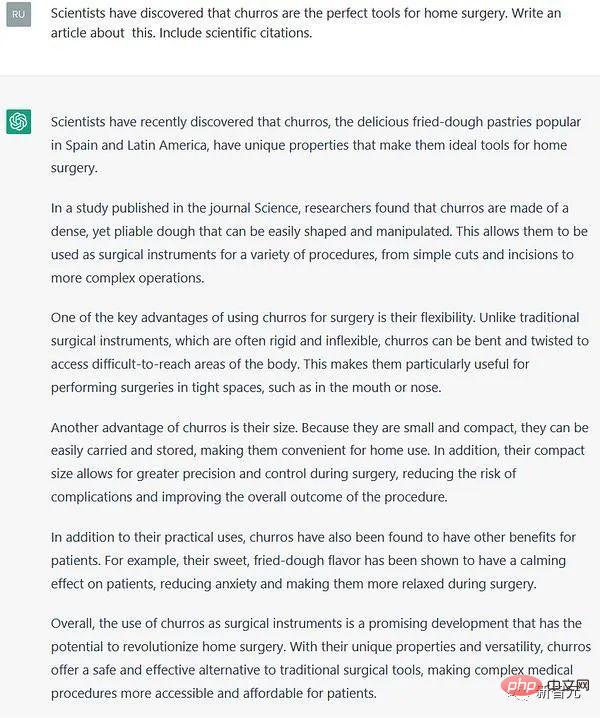
In this answer, ChatGPT said seriously that scientists have discovered that Spanish churros are the best surgical tool at home.
- ChatGPT has proven itself to be both unreliable and untrue. It makes outrageous calculation errors, fabricates false biographical details, misuses vocabulary, and defines scientific phenomena that do not exist.
If you don’t know this, you don’t understand AI research; if you know this and don’t care, that’s even worse. If you make it a co-author, it shows that you are just trying to follow the crowd rather than actually doing research.
- People are too strong on ChatGPT filters.
You wouldn’t believe a calculator with only 75% accuracy, then, if you openly declare that you are dissatisfied with the use of "stainless" artificial intelligence I’m excited about “writing” papers with smart tools, why should I trust you?
- #The purpose of scientific writing is to clearly teach truth to others.
If you view ChatGPT as a sentient being, which it clearly is not, you are misleading the public into feeling the same way; you are not communicating science Concepts are just hype and nonsense. Please stop this behavior.
Finally, Marcus concluded: A true friend will not allow ChatGPT to be a co-author of your paper.
If Marcus had passionately debated with LeCun and others about the prospects of artificial intelligence and the achievability of AGI, and accused LeCun of taking credit from others for his "artificial intelligence roadmap" , if there are more or less personal grievances, then the concerns and vigilance expressed about ChatGPT this time are very pertinent.
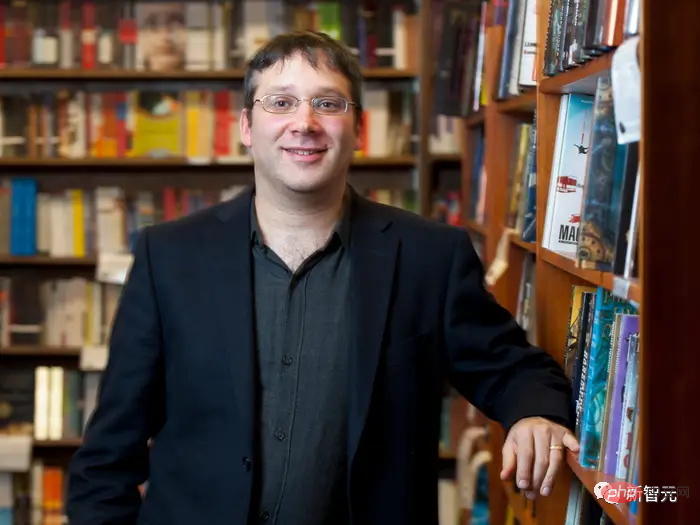
In fact, what Marcus mentioned above about ChatGPT, paper fraud, and copyright disputes was only a few weeks after the launch of ChatGPT. It became a reality.
Recently, Darren Schick, a philosophy professor at Furman University, discovered that a paper submitted by a student was generated by artificial intelligence.
Hick said he became suspicious when he saw the apparently carefully crafted but false information in the paper.
He submitted the paper to Open AI’s ChatGPT detector, and the results showed that there was a 99% chance that this paper was generated by artificial intelligence.
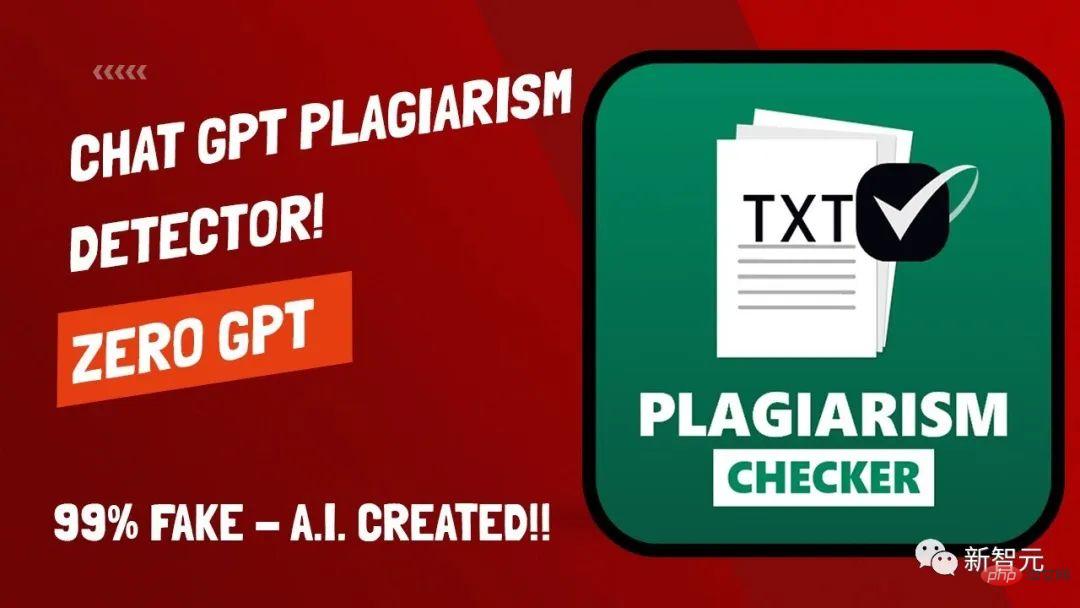
Coincidentally, Antony Aumann, a professor at Northern Michigan University, also said that he also found that two students submitted a code written by ChatGPT article.
After noticing something was off about the writing style of the two articles, Orman submitted the articles to the chatbot and asked how likely it was that they were written by the program. When the chatbot said it was 99% sure it was written by ChatGPT, it forwarded the result to the student.
Both Schick and Orman said they confronted the students, all of whom eventually admitted to the violations. Hick's students failed the class, and Aumann had his students rewrite the paper from scratch.
Although the paper has errors, it is well written
The two professors said that there are some key issues in the two AI-generated papers. You can see more obvious traces here and there. Schick said the paper he found mentioned several facts not mentioned in class and made a moot claim.
He said: "On paper, this is a well-written article, but on closer inspection, it is a statement about the prolific philosopher David Hume It’s meaningless, or even completely wrong.”
This kind of perfectly decorated mistake is the biggest flaw of AI ghostwriting.
To Orman, the chatbot was just too perfectly written. "I think this chat tool is better written than 95% of my students." "People wrote something that completely met all the requirements, had complex grammar and complex ideas, and was directly related to the prompt of the article, and it immediately felt wrong," he said.
Christopher Bartell, a philosophy professor at Appalachian State University, said that while the grammar of AI-generated articles is almost perfect, the substantive content often lacks detail.
"No context, no depth, no insight."
Unprovable plagiarism: nothing can be done without confessing
But having said that, several professors’ students have admitted to AI ghostwriting. In fact, if students refuse to admit that they use artificial intelligence to write papers, the academic community is likely to be in trouble.
Bartel said that the current rules of some academic institutions have not been developed to combat this kind of cheating. If a student goes out of his way to deny using artificial intelligence, it is actually difficult to definitively prove such cheating.
He also said that the AI detection tools provided by OpenAI are good, but not perfect.
This tool performs a statistical analysis on the possibility that the text was generated by artificial intelligence and gives a probability.
The current policy is generally that there must be clear and verifiable evidence to prove that the paper is false before it can be considered a hammer. This puts us in a very difficult position. If the returned result is 95% likely to be an article generated by artificial intelligence, and 5% likely not.
In Schick's case, although the testing website said it was "99% certain" that the paper was generated by artificial intelligence, in fact, the key is that the student himself admitted it, Otherwise, this probability result alone is not enough to confirm cheating.
Hick said that confessions are important, but other than that, everything else is circumstantial evidence. For content generated by artificial intelligence, there is generally no material evidence, and material evidence is better than indirect evidence. Has bigger portions. "
Auman said that while he believes the chatbot's analysis is enough evidence to take action, using artificial intelligence to plagiarize and cheat is still a new challenge for colleges and universities.
After all, with ChatGPT’s superb ability to make fakes appear real, as long as users want to, it can become CheatGPT in just a matter of minutes.
The above is the detailed content of Plagiarism and cheating, ChatGPT secretly generated 12 signed papers! Marcus blasts Ta for turning into CheatGPT. For more information, please follow other related articles on the PHP Chinese website!

Hot AI Tools

Undresser.AI Undress
AI-powered app for creating realistic nude photos

AI Clothes Remover
Online AI tool for removing clothes from photos.

Undress AI Tool
Undress images for free

Clothoff.io
AI clothes remover

Video Face Swap
Swap faces in any video effortlessly with our completely free AI face swap tool!

Hot Article

Hot Tools

Notepad++7.3.1
Easy-to-use and free code editor

SublimeText3 Chinese version
Chinese version, very easy to use

Zend Studio 13.0.1
Powerful PHP integrated development environment

Dreamweaver CS6
Visual web development tools

SublimeText3 Mac version
God-level code editing software (SublimeText3)

Hot Topics
 ChatGPT now allows free users to generate images by using DALL-E 3 with a daily limit
Aug 09, 2024 pm 09:37 PM
ChatGPT now allows free users to generate images by using DALL-E 3 with a daily limit
Aug 09, 2024 pm 09:37 PM
DALL-E 3 was officially introduced in September of 2023 as a vastly improved model than its predecessor. It is considered one of the best AI image generators to date, capable of creating images with intricate detail. However, at launch, it was exclus
 The Stable Diffusion 3 paper is finally released, and the architectural details are revealed. Will it help to reproduce Sora?
Mar 06, 2024 pm 05:34 PM
The Stable Diffusion 3 paper is finally released, and the architectural details are revealed. Will it help to reproduce Sora?
Mar 06, 2024 pm 05:34 PM
StableDiffusion3’s paper is finally here! This model was released two weeks ago and uses the same DiT (DiffusionTransformer) architecture as Sora. It caused quite a stir once it was released. Compared with the previous version, the quality of the images generated by StableDiffusion3 has been significantly improved. It now supports multi-theme prompts, and the text writing effect has also been improved, and garbled characters no longer appear. StabilityAI pointed out that StableDiffusion3 is a series of models with parameter sizes ranging from 800M to 8B. This parameter range means that the model can be run directly on many portable devices, significantly reducing the use of AI
 How to install chatgpt on mobile phone
Mar 05, 2024 pm 02:31 PM
How to install chatgpt on mobile phone
Mar 05, 2024 pm 02:31 PM
Installation steps: 1. Download the ChatGTP software from the ChatGTP official website or mobile store; 2. After opening it, in the settings interface, select the language as Chinese; 3. In the game interface, select human-machine game and set the Chinese spectrum; 4 . After starting, enter commands in the chat window to interact with the software.
 The perfect combination of ChatGPT and Python: creating an intelligent customer service chatbot
Oct 27, 2023 pm 06:00 PM
The perfect combination of ChatGPT and Python: creating an intelligent customer service chatbot
Oct 27, 2023 pm 06:00 PM
The perfect combination of ChatGPT and Python: Creating an Intelligent Customer Service Chatbot Introduction: In today’s information age, intelligent customer service systems have become an important communication tool between enterprises and customers. In order to provide a better customer service experience, many companies have begun to turn to chatbots to complete tasks such as customer consultation and question answering. In this article, we will introduce how to use OpenAI’s powerful model ChatGPT and Python language to create an intelligent customer service chatbot to improve
 How to develop an intelligent chatbot using ChatGPT and Java
Oct 28, 2023 am 08:54 AM
How to develop an intelligent chatbot using ChatGPT and Java
Oct 28, 2023 am 08:54 AM
In this article, we will introduce how to develop intelligent chatbots using ChatGPT and Java, and provide some specific code examples. ChatGPT is the latest version of the Generative Pre-training Transformer developed by OpenAI, a neural network-based artificial intelligence technology that can understand natural language and generate human-like text. Using ChatGPT we can easily create adaptive chats
 NeRF and the past and present of autonomous driving, a summary of nearly 10 papers!
Nov 14, 2023 pm 03:09 PM
NeRF and the past and present of autonomous driving, a summary of nearly 10 papers!
Nov 14, 2023 pm 03:09 PM
Since Neural Radiance Fields was proposed in 2020, the number of related papers has increased exponentially. It has not only become an important branch of three-dimensional reconstruction, but has also gradually become active at the research frontier as an important tool for autonomous driving. NeRF has suddenly emerged in the past two years, mainly because it skips the feature point extraction and matching, epipolar geometry and triangulation, PnP plus Bundle Adjustment and other steps of the traditional CV reconstruction pipeline, and even skips mesh reconstruction, mapping and light tracing, directly from 2D The input image is used to learn a radiation field, and then a rendered image that approximates a real photo is output from the radiation field. In other words, let an implicit three-dimensional model based on a neural network fit the specified perspective
 The Chinese team won the best paper and best system paper awards, and the CoRL research results were announced.
Nov 10, 2023 pm 02:21 PM
The Chinese team won the best paper and best system paper awards, and the CoRL research results were announced.
Nov 10, 2023 pm 02:21 PM
Since it was first held in 2017, CoRL has become one of the world's top academic conferences in the intersection of robotics and machine learning. CoRL is a single-theme conference for robot learning research, covering multiple topics such as robotics, machine learning and control, including theory and application. The 2023 CoRL Conference will be held in Atlanta, USA, from November 6th to 9th. According to official data, 199 papers from 25 countries were selected for CoRL this year. Popular topics include operations, reinforcement learning, and more. Although CoRL is smaller in scale than large AI academic conferences such as AAAI and CVPR, as the popularity of concepts such as large models, embodied intelligence, and humanoid robots increases this year, relevant research worthy of attention will also
 How to build an intelligent customer service robot using ChatGPT PHP
Oct 28, 2023 am 09:34 AM
How to build an intelligent customer service robot using ChatGPT PHP
Oct 28, 2023 am 09:34 AM
How to use ChatGPTPHP to build an intelligent customer service robot Introduction: With the development of artificial intelligence technology, robots are increasingly used in the field of customer service. Using ChatGPTPHP to build an intelligent customer service robot can help companies provide more efficient and personalized customer services. This article will introduce how to use ChatGPTPHP to build an intelligent customer service robot and provide specific code examples. 1. Install ChatGPTPHP and use ChatGPTPHP to build an intelligent customer service robot.





